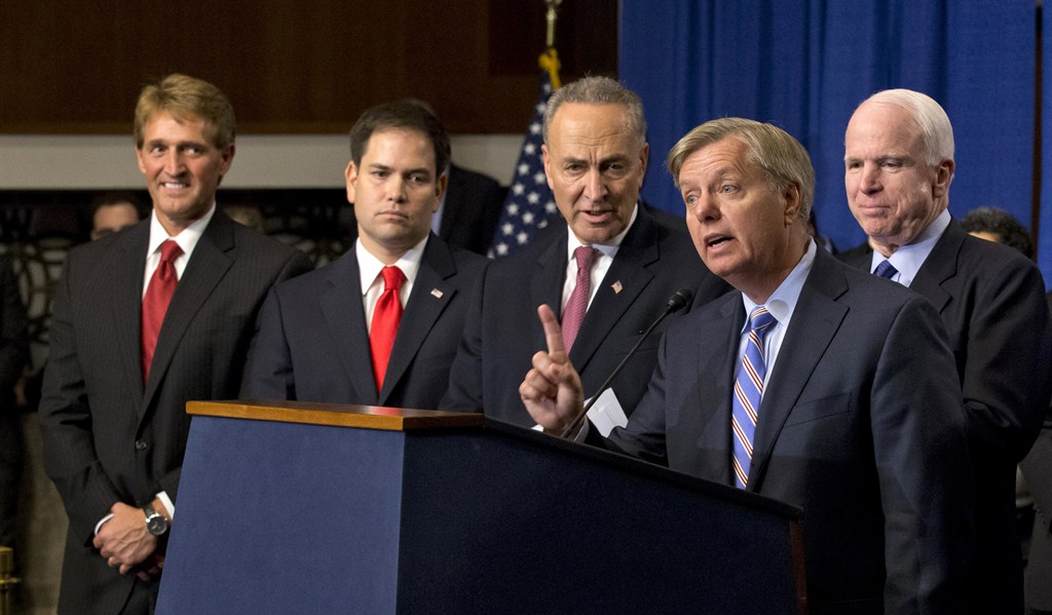As they say, “old habits die hard,” especially on Capitol Hill, where legislators are once again trying to sneak a dangerous new national identification database into law, under the public’s radar.
Hidden deep within the 800-odd pages of the Senate’s pending immigration reform bill is a provision for a new government ‘photo recognition’ system. This represents the latest in the on-going effort by the federal government to build a database of all U.S. citizens; a process that has accelerated since its initial failure to do so after a number of states balked at the REAL ID Act requirements for a stealth national ID card.
Simply – and deceptively -- called a “photo tool,” the pending legislation calls for all U.S. employers to “verify the identity of [new hires] using the photo tool,” which will allow them to “match the photo on a covered identity document provided to the employer to a photo maintained by a U.S. Citizenship and Immigration Services database.” According to Wired.com’s David Kravets, the database would contain the “names, ages, Social Security numbers and photographs of everyone in the country with a driver’s license or other state-issued photo ID.”
This isn’t the first attempt Congress has launched at a national ID database since the trouble into which the REAL ID stumbled. Database-obsessed legislators on the Hill, from both sides of the aisle, continue trying to slip one by the American public. The “E-Verify” system built into the 2011 “Legal Workforce Act” met all of the basic requirements for a national ID card. Supporters of the system claimed it was designed to prevent illegal immigrants from taking American jobs, but in reality it was nothing more than another backdoor attempt by the government to secure even greater control over American workers and businesses. Even worse, it set the stage for an “all-purpose security device, used for cashing checks, confirming the name on credit cards, and looking you up at the prescription counter,” according to the CATO Institute’s privacy expert, Jim Harper.
Recommended
The “photo tool” in the current “Immigration Modernization Act” goes a step further -- using a photo database rather than physical paperwork or cards. It could, for example, work in much the same way as Facebook’s photo recognition tool that automatically identifies subjects of photos uploaded to the site. Except that, rather than recommending “tags” as Facebook does, the government’s database could be used in a variety of business capacities; from verifying ages or other background data when making alcohol or gun purchases, to simply picking up a pack of sinus medication. Anywhere a citizen may need the government’s permission to make a purchase or enter a federally-controlled facility, the database could be used.
Attempts to “opt-out” of such a database would likely be countered in the same, carrot-and-stick manner as opposition to REAL ID: If you are not part of the database, you do not gain access to the goods you need or to the places you need to go. Should this program survive and the bill be signed into law, we will have surrendered to federal bureaucrats a virtually limitless ability to deny citizens all manner of goods and services, including those guaranteed in the Bill of Rights.
One of the greatest fears Americans should have with such a database is that we have no idea how this information will be used down the road. Once the government obtains the information, it will be impossible for us to know where it goes, what parties – government, private or foreign – might have access to it, how the information will be used, and how long it will be retained.
Furthermore, a national database of seemingly “basic” information can serve as a starting point for building a bigger, more comprehensive profile on every American citizen, using data from other government agencies. For example: firearms records from ATF, tax information from the IRS, health information via the Department of Health and Human Services, information on veterans from treatment at V.A. facilities, and even political contribution information collected by the Federal Election Commission (FEC) would be fair game.
Reports have surfaced in the last few days confirming that the IRS has in fact been targeting conservative organizations for investigation, and that the Department of Justice has been surreptitiously eavesdropping on communications to and from certain reporters. Such revelations lend a frightening degree of urgency to what should be a robust debate over a national ID database, such as the one lurking in the Senate’s immigration “reform” legislation.

























Join the conversation as a VIP Member